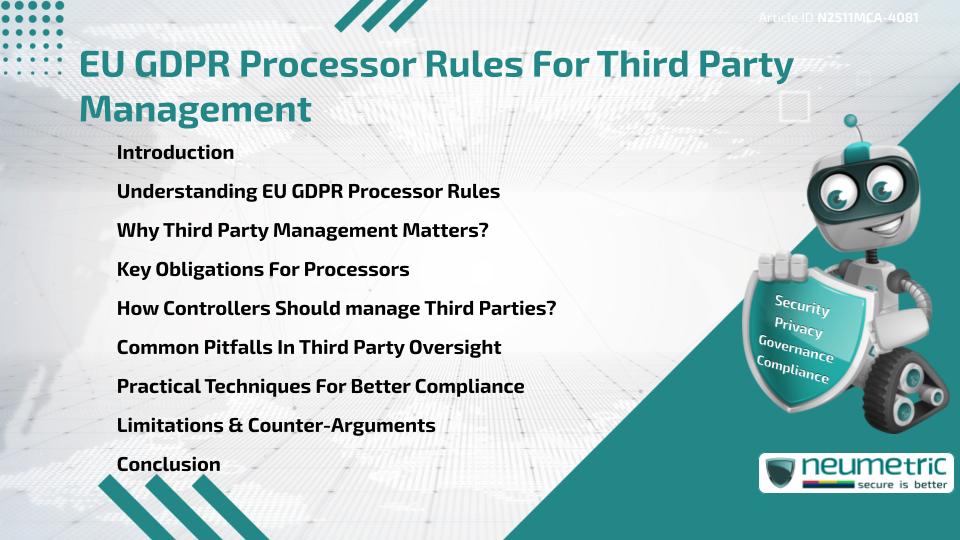Table of Contents
ToggleIntroduction
The EU GDPR Processor Rules set strict expectations for how organisations handle Personal Data when they rely on external service providers. These rules define processor duties, controller responsibilities & essential safeguards for working with third parties. They also explain what must be included in written agreements, how oversight should work & what happens when things go wrong. This Article offers a practical walk-through of the most important requirements, common challenges & proven techniques to help organisations keep Third Party data activities lawful & well-managed.
Understanding EU GDPR Processor Rules
The term processor refers to any external party that handles Personal Data on behalf of a controller. The EU GDPR Processor Rules explain how this relationship must operate to protect individual rights.
These rules emphasise written contracts, careful instruction & proper supervision. They also require processors to apply reasonable safeguards such as Access Controls, documentation & secure handling practices. Readers can explore the legal foundations through trusted sources such as the official European Commission site (https://commission.europa.eu) and the European Data Protection Board (https://edpb.europa.eu).
Why Third Party Management Matters?
Modern organisations rely heavily on external partners for storage, analytics, support services & day-to-day operations. This creates efficiency but also introduces Risk. If a processor mishandles data the controller remains responsible.
Independent explanations from the UK Information Commissioner’s Office (https://ico.org.uk) help clarify how this responsibility works in practice. The controller must know who processes data, how they process it & why they need access at all.
Key Obligations For Processors
Processors must follow documented instructions from the controller. They cannot decide their own purposes or methods. Under the EU GDPR Processor Rules these duties include:
- Keeping Personal Data secure
- Assisting with rights requests
- Supporting Incident Response
- Maintaining clear records
- Seeking approval before subcontracting
A helpful comparison can be found through the Irish Data Protection Commission (https://www.dataprotection.ie).
To simplify this relationship imagine a library where the controller is the head librarian & the processor is a volunteer assistant. The volunteer must follow the librarian’s directions, track activities & prevent unauthorised access. The assistant cannot lend books to new groups without permission just as a processor cannot bring in new sub-processors without approval.
How Controllers Should manage Third Parties?
Controllers must take active steps before & during the engagement. They must:
- Check the processor’s capability
- Use written contracts with clear duties
- Oversee performance through reviews or assessments
- Ensure international transfers follow legal measures
Common Pitfalls In Third Party Oversight
Typical mistakes include:
- Not updating agreements
- Allowing sub-processing without review
- Forgetting to document instructions
- Relying on verbal assurances
- Failing to check responses during incidents
Many organisations also assume that technical controls alone will solve compliance gaps. In reality human oversight & consistent coordination are equally important.
Practical Techniques For Better Compliance
The following techniques support stronger Third Party management:
- Use checklists during onboarding
- Review contracts at least every one (1) year
- Keep communication lines open with partners
- Train staff on how to supervise external activities
- Compare processor commitments against actual practice
These steps help ensure that EU GDPR Processor Rules are respected across the entire service chain.
Limitations & Counter-Arguments
Some argue that the rules create administrative load or slow down outsourcing. Others say that frequent checks may strain partner relationships. These concerns are valid but oversight remains necessary because misuse of Personal Data can cause harm.
A balanced approach involves simple documentation, clear expectations & respectful communication so that compliance does not disrupt genuine collaboration.
Conclusion
The EU GDPR Processor Rules provide a clear structure for safe, lawful & accountable Third Party handling of Personal Data. When controllers & processors follow these duties they reduce Risk & support trust.
Takeaways
- Processors must follow strict instructions from controllers
- Contracts are the foundation of Third Party Governance
- Oversight must be ongoing & documented
- Simple techniques can improve coordination & reduce Risk
- Both controllers & processors share responsibility for strong data handling practices
FAQ
What are processors under the EU GDPR Processor Rules?
Processors are external parties that handle Personal Data for a controller under strict instructions.
Why do controllers remain responsible?
Controllers decide the purpose of processing so they hold overall responsibility even when tasks are outsourced.
What must a processor contract include?
It must include duties, allowed actions, safeguards, support responsibilities & rules for sub-processing.
How can organisations check processor performance?
They can review records, request clarifications or carry out structured assessments.
Are sub-processors allowed?
Yes, but only with permission from the controller & under a written agreement.
Do the EU GDPR Processor Rules apply to all sectors?
They apply whenever Personal Data is handled within the scope of European law regardless of industry.
Is consent needed for using a processor?
Consent is not needed but a lawful basis for the processing activity must be in place.
Need help for Security, Privacy, Governance & VAPT?
Neumetric provides organisations the necessary help to achieve their Cybersecurity, Compliance, Governance, Privacy, Certifications & Pentesting needs.
Organisations & Businesses, specifically those which provide SaaS & AI Solutions in the Fintech, BFSI & other regulated sectors, usually need a Cybersecurity Partner for meeting & maintaining the ongoing Security & Privacy needs & requirements of their Enterprise Clients & Privacy conscious Customers.
SOC 2, ISO 27001, ISO 42001, NIST, HIPAA, HECVAT, EU GDPR are some of the Frameworks that are served by Fusion – a SaaS, multimodular, multitenant, centralised, automated, Cybersecurity & Compliance Management system.
Neumetric also provides Expert Services for technical security which covers VAPT for Web Applications, APIs, iOS & Android Mobile Apps, Security Testing for AWS & other Cloud Environments & Cloud Infrastructure & other similar scopes.
Reach out to us by Email or filling out the Contact Form…


